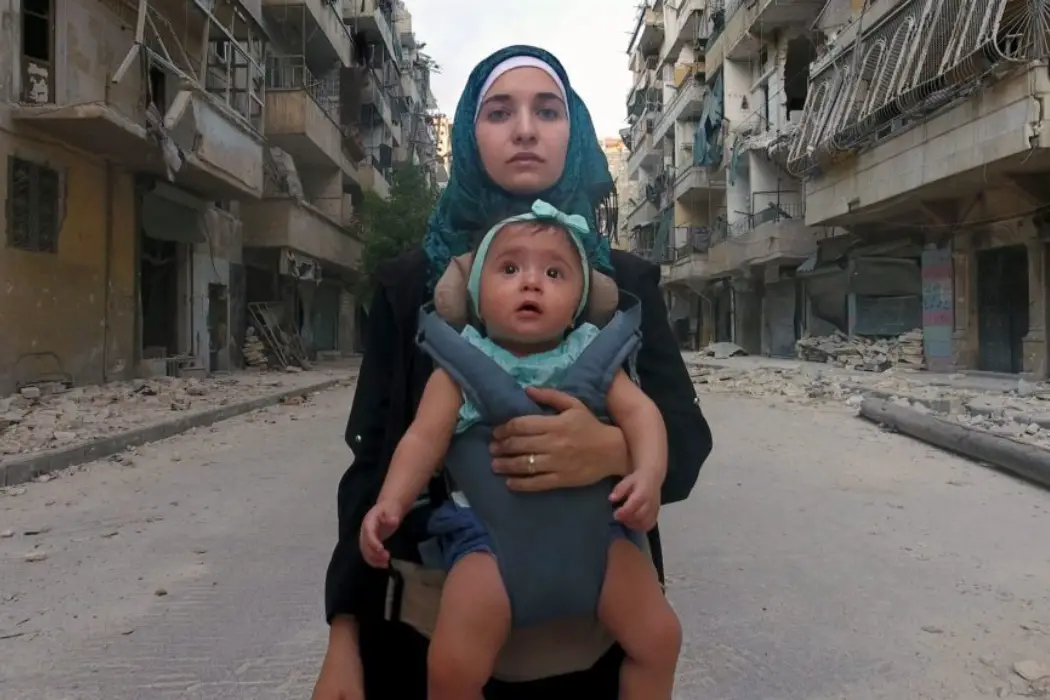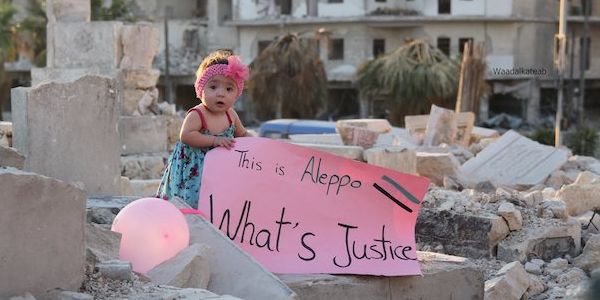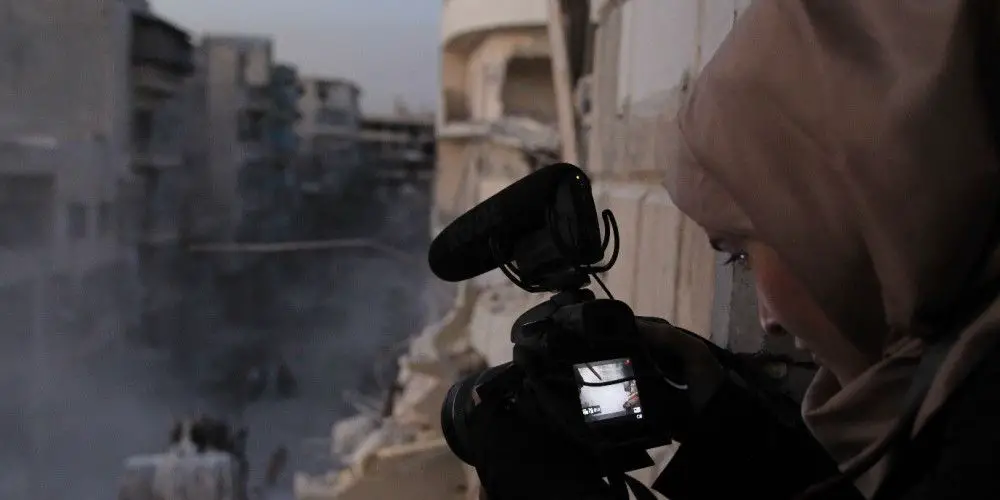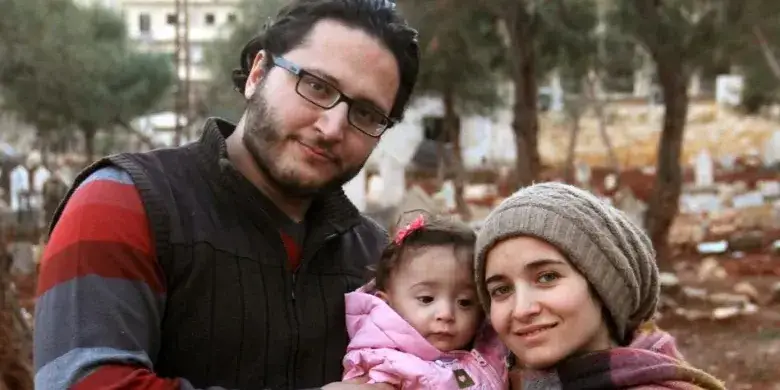The Stereotype-Shattering Insights Of FOR SAMA

Andrew Emerson is a University of Chicago student. His high…
In an ideal world, nobody would have to endure the things that happen in Waad al-Kateab and Edward Watts’ For Sama. Framed as a letter to al-Kateab’s daughter Sama, the documentary tells the story of al-Kateab and her husband Hamza, two Syrians who lived in Aleppo during the Syrian Civil War. After the initial protests against Bashar al-Assad gave way to armed conflict, the couple stayed in the eastern part of Aleppo, where Hamza set up a hospital. Even as Aleppo came under siege, the two of them refused to leave, only capitulating when the city finally fell to Assad’s forces in late 2016.
At first glance, For Sama might not seem particularly interesting. In recent years, after all, many documentaries and films have been made about the Syrian conflict. The past two years alone have seen the release of works like Of Fathers and Sons, Last Men in Aleppo, City of Ghosts, The White Helmets, A Private War, and Hell on Earth: The Fall of Syria and the Rise of ISIS.
Despite its potentially unremarkable appearance, however, I’d argue that there are three reasons why For Sama proves more powerful and significant than many of its peers. First, in contrast to many other documentaries about Syria, al-Kateab’s film recounts the conflict from a woman’s point of view. Second, it counters our stereotypical view of what life is like in wartime. And third, it offers an unconventional definition of “the political.”

A Woman’s Perspective
To start, For Sama discusses the Syrian conflict from an oft-neglected perspective. In the past, many documentaries about Syria (including several of the ones mentioned earlier) have centered almost exclusively on men, to the point that women literally don’t even appear in these films’ shots. Partially as a result, these films give you the impression that women are just bit players in the Syrian conflict, as though they had no interest or role in important political developments.
By telling al-Kateab’s story, For Sama offers a much-needed corrective to this limited view of women. Throughout the documentary, al-Kateab is always politically engaged. During the Arab Spring, she joins student-led protests against Assad. And after the protests degenerate into civil war, she decides to film every part of her daily experience, eventually sending some of her footage to Britain’s Channel 4 News. As she puts it early in the documentary, she films to ensure that Sama – and, by extension, future generations – will understand “what we were fighting for.”
It might seem trivial that For Sama focuses on a woman instead of men. But it’s actually quite subversive. They probably didn’t mean to, but past documentaries on Syria promoted a masculinized view of history, one in which only men serve as the drivers of important events. In recounting her perspective on events in Syria, al-Kateab reminds us that this understanding of the world is woefully incomplete. Just like men, women can and should be considered agents of sociopolitical change.
Wartime Life
Its female perspective aside, For Sama also stands out for how it depicts life in war zones. Typically, after all, the news media portray war zones as places of seemingly unending fighting and suffering. When it comes to the Syrian conflict in particular, this idea has been indirectly reinforced by films like City of Ghosts, The White Helmets, and Last Men in Aleppo, all of which mainly focus on the war’s military dimension and the horrific damage it has engendered.
In For Sama, to be sure, al-Kateab suffers a lot, and the film would’ve been dishonest if it had pretended she hadn’t. But what’s surprising is that this suffering is regularly punctuated by moments of tranquility, uplift, and apparent normalcy. For instance, it’s during the war that she and Hamza decide to get married. As late as 2015, the two of them are shown attending a boisterous street party, where people are shown dancing and launching fireworks. And at various points throughout the film, we watch al-Kateab and her family members do things that any normal family would do, like cuddle on the couch, plant a garden, and so on.

In many ways, For Sama’s portrayal of Aleppo repudiates our conventional understanding of what war zones are like. Although the news media would make you think otherwise, For Sama asserts that there can be moments of joy and solidarity even in times of unbearable suffering. Familiar statements like “war is hell” aren’t exactly wrong, but to use a phrase that Watts employed in an interview, they don’t capture “the movement between light and dark” that truly characterizes life in war zones.
Ultimately, moreover, For Sama’s depiction of wartime life can also help us understand certain aspects of Syrian rebels’ behavior. In many documentaries about the Syrian conflict, the people we meet express reluctance to leave Syria, even as they repeatedly suggest that life under Bashar al-Assad is miserable and oppressive. Oftentimes, the explanations these people give for staying are abstract and idealistic, like “There are lives that need to be saved” (to paraphrase what many people say in The White Helmets).
By contrast, For Sama suggests that Syrians have more poignant and concrete motives for not leaving. Given her fervent belief in democracy, there are certainly traces of political idealism in al-Kateab’s decision to stay in Aleppo. But as illustrated by the film’s positive depiction of wartime life, she also has a deep emotional attachment to Aleppo as her hometown. Syria may be a miserable and oppressive dictatorship – but in spite of this, we realize that it’s still where al-Kateab has spent some of the happiest moments of her life.
The Inescapability of Politics
Finally, For Sama also presents a new, chillingly expansive definition of what counts as “political”. Traditionally, on the one hand, we tend to make a distinction between the political and the personal (or “apolitical”). We consider the things we do in our day-to-day lives – going to work, spending time with family, and so on – as belonging to the latter. For most of us, moreover, the idea that such activities could be “political” is either nonsensical or uncomfortable, as though we were each entitled to an inviolate “personal sphere” in which politics plays no part.
What For Sama shows us, however, is that this kind of sphere doesn’t exist in Syria. Midway through the film, for instance, there’s a sequence where the camera gives us a look at Aleppo’s street life, showing us people who’re playing chess, milling around a marketplace, and splashing around in large puddles. As the camera does this, al-Kateab notes via voice-over that “To try and live a normal life in this place [Aleppo] is to stand against the regime.”

In sequences like these, al-Kateab challenges our traditional understanding of the political. By simply trying to go about their normal lives, al-Kateab and her family inherently – and perhaps even involuntarily – undertake a form of political activism. In doing things that we’d consider anything but political, like sending Sama to school or having dinner with friends, al-Kateab unavoidably makes a political statement against Assad and his attempts to bully people into fleeing Syria or surrendering.
For al-Kateab and the rest of the Syrian opposition, then, there’s no such thing as a “personal sphere.” Avoiding politics is impossible for them – because, in a sense, even not engaging in overt political activism constitutes a form of political activism. Alongside its depiction of wartime life, this is another reason why For Sama proves so moving: unlike us, al-Kateab doesn’t have the luxury of being able to “cordon off” the effects and reach of politics.
Conclusion: Humanizing Refugees
In closing, I should note that everything I’ve just discussed carries immediate implications for Westerners. In recent years, after all, Syrians have been met with great hostility in Europe and the United States. People like Donald Trump, Nigel Farage, Marine Le Pen, and Matteo Salvini have vilified Syrian refugees, portraying them as culturally incompatible freeloaders who’ll “contaminate” the West with violence, terrorism, and lawlessness.
Thankfully, the things that make For Sama unique also allow it to refute this dangerous thinking. By portraying a politically engaged woman who finds joy in ordinary life, the documentary makes it clear that Syrians share our desire for freedom, democracy, and peaceful living. And in illustrating what “the political” looks like in Syria, For Sama shows that Syrians have sacrificed more than most of us ever will for the sake of democratic ideals. Aside from raising the bar for future documentaries about Syria, then, For Sama can also contribute to today’s misguided debates over immigration and refugees.
Have you seen For Sama? If so, what did you think? Please share your thoughts in the comments!
Does content like this matter to you?
Become a Member and support film journalism. Unlock access to all of Film Inquiry`s great articles. Join a community of like-minded readers who are passionate about cinema - get access to our private members Network, give back to independent filmmakers, and more.
Andrew Emerson is a University of Chicago student. His high school English teacher once asked him to read a batch of Roger Ebert’s reviews for class, and he’s been fixated on the idea of writing about movies ever since. You can follow his attempts to pursue this obsession at http://filmwatcher.net/.













